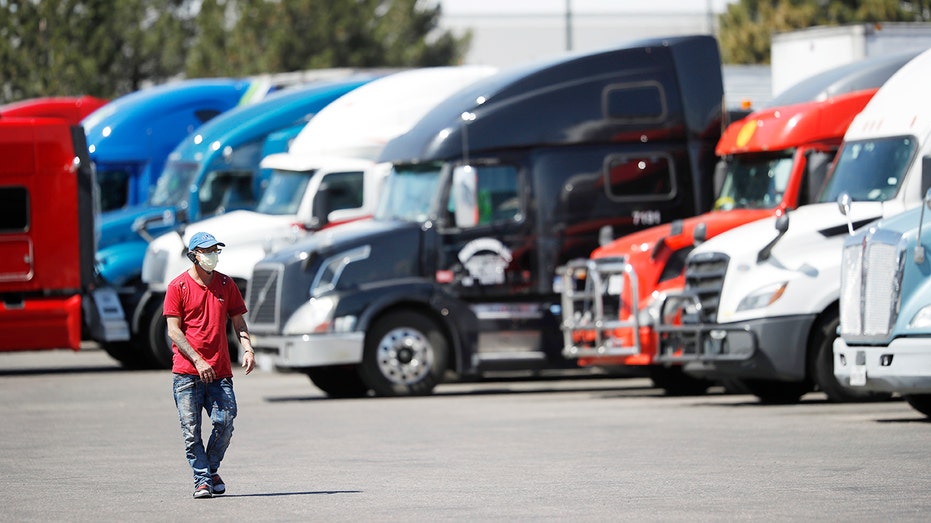Coronavirus-induced low shipping rates a 'one-way ticket out of business' for some truckers
Experts warn rates are below levels where companies can run trucks profitably
Get all the latest news on coronavirus and more delivered daily to your inbox. Sign up here.
Truck drivers are struggling with a new challenge during the coronavirus crisis – low shipping rates – as demand in the sector declines.
According to data from freight and analytics firm DAT, rates as of April 30 had fallen to five-year lows for both the reefer and flatbed equipment categories. For dry van freight, the national average was just $1.64 per mile.
"The current spot rates are extremely low and carriers will not be able to sustain operations very long at these levels," the report read.
In some areas, drivers are being offered rates of less than $1 per mile.
TRUMP CELEBRATES TRUCK DRIVERS AMID CORONAVIRUS CRISIS: 'THANK GOD FOR TRUCKERS'
Demand has declined since large swaths of the economy have shut down, which has caused rates to fall.
"Rates are below numbers at which you can run a truck profitably," Brian Fielkow, president of multimillion-dollar trucking and logistics company Jetco Delivery, told FOX Business.

Truck driver Camilo Diaz of Miami wears a mask after parkig his rig at the Flying J Truck Stop during the outbreak of the new coronavirus April 11, 2020, in Aurora, Colo. (AP Photo/David Zalubowski)
Over the weekend, truckers drove their big rigs to Capitol Hill to protest low rates – with some hoping for government intervention. President Trump acknowledged the demonstration in a tweet.
There is a debate within the industry over whether natural market forces or brokers are to blame for driving rates lower. Brokers help coordinate the transaction between the trucker and the shipper and make a profit margin off of the spread.
CORONAVIRUS STIMULUS PHASE FOUR PROPOSALS INCLUDE THESE TAX POLICIES
But there are definitive indicators that market forces are at play. Fielkow noted that an initial spike in demand throughout parts of the industry, like food delivery, has leveled out.
Load posts in April were down more than 54 percent year over year.
"It's a painful decision and in some ways it's counterintuitive because we want to work … you've got to park your truck if you can't run profitably," Fielkow said. "If you are actually in the red on the work you do, it's a one-way ticket out of business."
If more trucks remained parked to keep from losing money, it could have the added effect of lowering capacity and causing rates to respond.
TRUCK DRIVERS DELIVERING DURING CORONAVIRUS CRISIS NEED MORE PRIVATE SECTOR SUPPORT
However, it is ultimately up to the individual company to know its numbers. It may be worth it, for example, to accept a job that returns only a slight profit since many companies are being forced to re-examine their margins, Fielkow said.
Coming off of a rough year in 2019 – with nearly 800 trucking company failures – the current economic pressures are likely to cause more companies to close.
As previously reported by FOX Business, tough conditions brought on by the pandemic were expected to separate the financially strong companies from companies who were struggling at the outset of the year.
And that will be a problem when the economy begins to slowly rebound – because there may not be enough capacity in the market to keep pace with demand.
CLICK HERE TO READ MORE ON FOX BUSINESS
"Demand does not have to boom, demand does not have to storm back for people to feel the capacity pressure," Fielkow said.
GET FOX BUSINESS ON THE GO BY CLICKING HERE
Truckers have received high praise for their essential role in keeping the economy moving during the coronavirus pandemic. Trump held an event at the White House to celebrate the industry, calling drivers the "foot soldiers who are carrying us to victory" in the "war" against the virus.




















